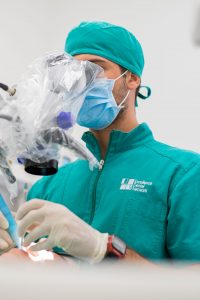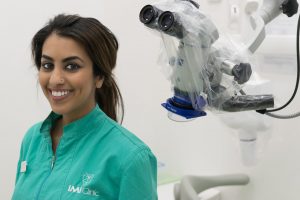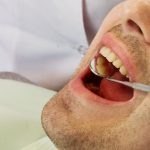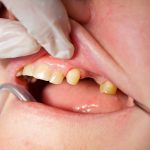It has become recognised that periodontal disease is closely connected to several systemic diseases, including osteoporosis, cardiovascular disease, diabetes and the risk of premature birth.[i] Dr Francesco Martelli has made the study of the effects of periodontal disease on general health his life work, and he now leads a network of clinics conducting customised, non-surgical periodontal treatment.
Dr Martelli originally trained as a general practitioner in the 1980s before re-qualifying as a periodontologist and implantologist. In Florence, Italy, he became an expert at treating aggressive periodontitis with surgical procedures. However, after around 15 years of performing first-class treatment, Dr Martelli found himself intrigued by patients who did not respond or became worse after surgery. He recognised that he was able to stabilise the teeth of many patients but despite his best efforts, for others there was only little or no improvement in their periodontal situation. In order to understand the challenge of periodontal disease more comprehensively, Dr Martelli decided to return to education and enhance his knowledge of microbiology, molecular cell biology, biochemistry, genetics and immunology.
“At the end of this updating process I had more knowledge in terms of microbiology, immunology and genetics and could now understand the reasons why some patients did not get any benefit from surgical periodontal treatment,” Dr Martelli said from his IMI Clinic in Leeds.
Around the year 2000, new chair side microbiological testing became available on the market, making it possible for Dr Martelli to both identify and quantify periodontal pathogens. This type of testing provided him with clear information about the oral environment, the composition of the microbes that colonise in periodontal pockets and a better understanding of the molecular biology and ecological system of each individual patient. Dr Martelli was able to precisely customise treatment according to the patient’s genetic and microbiological predisposition.

This new insight allowed Dr Martelli and his team to develop ground breaking strategies to manage and challenge periodontal disease. Gradually, he and his clinical teams were able to significantly reduce the number of surgical procedures they performed. By carefully tailoring treatment according to the patient’s microbiological, genetic and enzymatic assessments a customised treatment plan, adapted according to the diagnostics of each individual patient, can be delivered to a large number of patients, both consistently and effectively.
In order to have his treatment methods recognised, Dr Martelli and his associates conducted double-blinded randomised studies on 2,683 dental patients at a number of different dental centres. This allowed them to evaluate the efficacy of the new protocol and revealed that periodontal treatment using laser irradiation, guided by accurate microbiological patient characterisation, and was consistently effective in modifying oral microbiome and eradicating periodontal pathogens, thereby restoring long-term periodontal health.[ii]
Describing the bio laser assisted therapy, Dr Martelli stated: “Operating microscopes are used to guide the laser light. This allows us to penetrate periodontal tissue and deliver selective and precise action to break down cell membranes and destroy periodontal pathogens. By using laser treatment, we do not damage any healthy tissue and we are able to root plane the teeth, eradicate pathogens and bio-modulate inflammation without detaching the gum or causing bleeding. Through this approach, we have achieved an up to 100% success rate and patients receive a solution that is non-invasive so there is less pain, sensitivity and swelling.
“Even the assessments that we carry out are painless. The microbiological test for example, is carried out by inserting a small cone of absorbent paper into the periodontal pocket. The periodontal disease risk or genetic test is simple; a swab taken from the mucosa inside the cheek.”
The process is carefully monitored, he added.
“After each session we check the status of the microflora ecosystem once again to ensure that we have either reached our final goal or if we need to supplement the treatment. This does not mean that we never do periodontal surgery but we have been able to reduce it right down to around 2-5% of patients, and only after we have tried the personalised, laser assisted PerioBlast™ protocol first.”

Dr Martelli’s passion for this revolutionary treatment is fuelled by the fact that as well as killing off periodontal pathogens, the PerioBlast™ protocol also triggers the immune system into action and bio-stimulates the bone marrow stem cells surrounding the teeth. Apart from genetic, microbiological and biomechanical assessments, Dr Martelli and his clinicians also make bone metabolism assessments to measure bone density. This gives them insight into the health of the maxilla and mandible, indicates where the patient presents in terms of osteopenia or osteoporosis and monitors osseous-regeneration of the periodontal bone and, ultimately, the stability of the teeth.
Dr Martelli believes that this customised approach to treatment has the potential to restore the long-term periodontal health and prevent relapse. In just three words, he summed up the key points of the PerioBlast™protocol: “Decontamination, bio-modulation and bio-stimulation.” This method modifies the bacterial communities of periodontal pockets, restores the oral ecosystem to health and offers enduring stability. He also claims that it has the potential to keep the teeth in function for the rest of a patient’s life, providing they are fully compliant following the procedure.
When asked about healing time, Dr Martelli explained that there are two facets to healing: “In terms of the infection and the microbiology of the situation, I can usually reach a solution within a few weeks. By eradicating the infection we can then help the periodontal tissues to heal, stimulate bone growth and improve bone density that will have benefits for many for years to come.
Dr Martelli concluded that periodontal therapy guided by the microbiological characteristics of the patient not only prevents pathogenic bacteria from thriving and destroying periodontal tissues, but also has the potential to prevent those pathogens from entering the bloodstream and causing or exacerbating other systemic diseases.
For further information about the PerioBlast™ protocol and IMI Clinics visit www.perioblast.com
[i] Kim J & Amar S. Periodontal disease and systemic conditions: a bidirectional relationship. Odontology. 2006 Sep; 94(1): 10–21. https://www.ncbi.nlm.nih.gov/pmc/articles/PMC2443711/ [Accessed 18th July 2017]
[ii] Martelli FS et al. Long-term efficacy of microbiology-driven periodontal laser-assisted therapy. European Journal of Clinical Microbiology & Infectious Diseases March 2016. Vol. 35(3)423-431. https://link.springer.com/article/10.1007/s10096-015-2555-y [Accessed 18th July 2017].
















